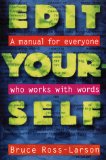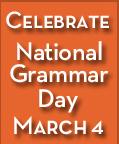My five favorite reference books for writers
A printed book is sometimes the best place to find a solution to your question about writing style, punctuation, or grammar.
Here are my five favorite reference books. I have updated this list because my favorites have changed over time, most notably with the elevation of Garner’s Modern American Usage from the “honorable mention” list.
- Edit Yourself: A manual for everyone who works with words by Bruce Ross-Larson. Everyone should own this small, inexpensive, easy-to-use book. I use Part II, the back of the book, the most. It lists troublesome words in alphabetical order. It’ll help you cut pretentious words and resolve problems such as deciding between “which” and “that.” Part I describes and offers solutions to problems common in everyday writing. Buy it today!
- Garner’s Modern American Usage by Bryan Garner. This book runs over 900 pages in length, so it covers just about any question you may ask. When I first published this list of favorite books, I wrote: “But it’s so darned technical I only turn to it as a last resort.” How times have changed! Now it’s the first book I turn to when tackling problems such as “Treasurys vs. Treasuries — Which is the right spelling?” I rank it behind Ross-Larson’s book only because I think Edit Yourself will be much more useful for most of my readers.
- The Copyeditor’s Handbook: A Guide for Book Publishing and Corporate Communications by Amy Einsohn. I didn’t own this book when I first compiled my list of favorite books. Like Garner’s book, this delves more into the nuances of different grammar issues than book readers who aren’t grammar nerds.
- The Associated Press Stylebook. If you’ve ever heard an editor say, “We follow AP style,” they’re talking about the print or online edition of this style book. I rarely check my print edition because I prefer the constantly updated online edition, which I complement with a subscription to the online Webster’s New World College Dictionary. There’s also subscription software, Styleguard, for checking adherence with this guide. (I stopped using the software for reasons described in my blog post about Styleguard.) You can follow AP style on Twitter at @APStylebook or on Facebook.
- The Grammar Bible by Michael Strumpf and Auriel Douglas. This book gives plain English explanations of vexing issues of grammar and more.
Honorable mention
- The Chicago Manual of Style (CMOS) was my favorite reference book for many years. If you’re writing a book or Ph.D. dissertation (as I was doing when I bought this book), rather than blog posts, articles, or other marketing pieces, this is an essential reference. It’s also useful for topics such as tables and other exhibits, which aren’t addressed by AP style. You can also subscribe online to the manual, get it integrated into PerfectIt proofreading software (which I’ve blogged about in “My three main software tools for proofreading,” and follow it on Facebook or Twitter.
- Words into Type, based on studies by Marjorie E. Skillin, Robert M. Gay, and other authorities. Like CMOS, this book is aimed at individuals preparing manuscripts for publication. This fat classic from 1974 used to be my second “go to” reference book when flummoxed by a question of style, punctuation, or grammar. The importance of this book fell for me when I became a convert to AP style.
- The Elements of Style by William Strunk and E.B. White. If you care about good writing, you should read this classic at least once. An early edition is online at Bartleby.com.
Your favorites?
If you’re passionate about good writing, you’ve probably got a favorite reference that I’ve overlooked. Please tell me about it by answering this poll question.
Disclosure: If you click on an Amazon link in this post and then buy something, I will receive a small commission. I provide links to books only when I believe they have value for my readers.
Updated: November and December 2021








Thanks Susan! I own older editions of #3 and #4.
I HIGHLY recommend “On Writing Well” by William Zinsser. This gem stays with you your entire writing life. “What would Zinsser say?” echoes in my mind when I’m writing and editing my own work or that of others.
Karen, thank you for your comment. I own several books by Zinsser. Anything he writes is worth reading.
I know you’ve asked for reference books, but I think half of understanding what’s in them comes from reading well-edited writing.
So by all means try these books (I use Words Into Type). But if you want to know why the serial comma may be important, or see how someone deftly avoids a dangling participle, read good stuff. Especially if you prefer to learn by doing, as I do.
Any number of good magazines and newspapers, online and print, will do the trick. I still believe that current British writers and publications are on the whole better–more clear, vivid, forceful–than their American counterparts. If you find that too reactionary, go part-way there with U.S. citizen Christopher Hitchens and the Brit/American hybrid Economist magazine.
Joe,
I agree that reading good writing helps. Thanks for your comment!
I too use the Chicago Manual of Style, Strunk & White and the AP Stylebook. For anyone writing copy, I also highly recommend Bob (Robert W.) Bly’s “The Copywriter’s Handbook.”
Randy, thanks for adding Bob Bly’s book.
This is helpful… In addition to APS, I do keep “Write right!: a desktop digest of punctuation, grammar, and style” By Jan Venolia, within reach. Fun!
Sumantra,
Glad you found it helpful. I’m happy to learn about Write Right as an additional resource.
I enjoy sharing grammar/style/usage and business/financial titles. I highly recommend The Gregg Reference Manual for such issues. I knew the author and currently answer questions from readers on grammar, usage, and style issues. For financial clients, I use The Wall Street Journal Guide to Business Style and Usage. I also highly recommend Garner’s Modern American Usage, Words Into Type, The American Hertiage Guide to Contemporary Usage and Style, and Swan’s Practical English Usage. I was raised on The Chicago Manual of Style and still use it often (16th edition now available). My library includes over 100 other titles in the field, and I never tire of reading about writing and editing.
Jeff,
I’m always happy to meet more writing reference enthusiasts. I’ll check out the few you mentioned that I haven’t used.
What’s your Ph.D. in? Mine is in Japanese history.
I like the list. I also would add the book, “Line by Line,” by Claire Kehrwald Cook.
Aimie, I sure like the title of “Line by Line.” I will look for it.
I really enjoyed “Eats Shoots and Leaves”. While it might not be referenceable, it underscores the importance of getting grammar and punctuation right and its impact on your readers.
Great idea for a post. Would love to see books you’d recommend on writing in general.
Thank you, Zack! I enjoyed that book, too.
Some more general writing books show up on my recent post with my readers’ favorite books (http://investmentwriting.com/blog/2011/10/your-favorite-books-for-writers/). Anything by William Zinsser is worthwhile, especially On Writing Well.
Bryan Garner is a demigod. I own most of his prodigious oeuvre, and have taken a handful of writing seminars from him. I heartily endorse his position on your list, Susan.
Thanks, Garrison! I’m a fan, too.